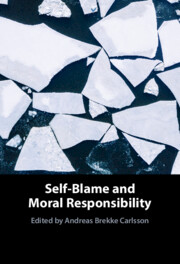Book contents
- Self-Blame and Moral Responsibility
- Self-Blame and Moral Responsibility
- Copyright page
- Contents
- Contributors
- Acknowledgments
- Introduction
- Part I The Nature of Self-Blame
- Part II The Ethics of Self-Blame
- Part III Self-Blame and Moral Responsibility
- Chapter 8 Guilt and Self-Blame within a Conversational Theory of Moral Responsibility
- Chapter 9 Deserved Guilt and Blameworthiness over Time
- Chapter 10 Blame, Deserved Guilt, and Harms to Standing
- Chapter 11 Reason to Feel Guilty
- References
- Index
Chapter 9 - Deserved Guilt and Blameworthiness over Time
from Part III - Self-Blame and Moral Responsibility
Published online by Cambridge University Press: 05 May 2022
- Self-Blame and Moral Responsibility
- Self-Blame and Moral Responsibility
- Copyright page
- Contents
- Contributors
- Acknowledgments
- Introduction
- Part I The Nature of Self-Blame
- Part II The Ethics of Self-Blame
- Part III Self-Blame and Moral Responsibility
- Chapter 8 Guilt and Self-Blame within a Conversational Theory of Moral Responsibility
- Chapter 9 Deserved Guilt and Blameworthiness over Time
- Chapter 10 Blame, Deserved Guilt, and Harms to Standing
- Chapter 11 Reason to Feel Guilty
- References
- Index
Summary
The literature on moral responsibility is ripe with accounts of what it takes for an agent to become blameworthy. By contrast, very little has been written about what it takes for an agent’s blameworthiness to cease or diminish. It seems that there are certain things a wrongdoer can feel or do that might make her less blameworthy than she would otherwise have been. She might experience guilt, atone, apologize, and make reparations. In this chapter, I will argue that prominent accounts of blameworthiness are unable to explain how such actions and emotions can influence one’s blameworthiness. I will then present an alternative account. If we understand blameworthiness in terms of deserved guilt rather than fitting resentment, we can give a plausible account of how blameworthiness can change over time. The fact that a wrongdoer has already experienced guilt, atoned, or apologized will make her less deserving of guilt, and therefore less blameworthy.
- Type
- Chapter
- Information
- Self-Blame and Moral Responsibility , pp. 175 - 197Publisher: Cambridge University PressPrint publication year: 2022
- 7
- Cited by

